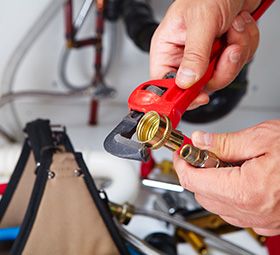
Over 45 Years of Experience in Plumbing and Heating Services
Read Our Frequently Asked Questions
Water heater leaks:
When a water heater leaks most people want to know if it can be repaired rather than replaced. The life of a water heater is usually about ten years. If the heater is ten years or older, the homeowner may want to replace it for the sake of peace of mind. If the leak at the water heater is from a fitting, it can be repaired. However, if the tank itself is leaking, there is no other alternative but to replace it.
Sewer gas:
Occasionally a homeowner will notice a bad smell coming from the vicinity of plumbing fixtures in the home. This may be caused by "dry trap." If a fixture such as a shower or a bathtub has not been used in a long time, the trap may dry out and thus allow sewer gas to come back into the home. The solution is to run water into the fixture and allow the trap to again fill up with water. If this does not solve the problem, it is time to call a professional from JP Mulvey Plumbing & Heating Inc to check it out and make a repair.
High water bills:
There are several ways to find out if your water bills are higher than they need to be:
- Check Faucets for dripping water. Fix a leaky faucet promptly.
- Be sure to check under sinks for moisture or leaks
- Periodically check your toilets for leaks: Place a few drops of food coloring in the tank, not the bowl. A couple of tablespoons of instant coffee or Kool-Aid will work too.
- Check the toilet after about thirty minutes. If the water in the bowl has some of the colors in it, the tank is leaking and the tank may need to be rebuilt.
- Check for underground leaks or undetected leaks in the home: Turn off the main water valve inside your home and then go outside and check your water meter. If it is still turning you may have an underground leak. Alternatively, write down the numbers on your water meter at the beginning of a period when your home is going to be unoccupied for a few hours. Check the meter when you return; if the numbers have changed, there may be a leak somewhere inside the home.
To prevent indoor faucets from freezing in very cold weather:
- Leave the cabinet doors open under the faucets so they can get a bit more heat. In extreme cases, let the water trickle very slowly into the sink.
- Insulate water pipes that may be exposed to freezing temperatures or wind.
- Water pipes that are not being used should be drained for the winter in areas where there may be severely cold weather.
- If there is plumbing in your garage, be sure to keep your garage door closed when it is very cold. Pipes in unheated garages or basements should be insulated.
If your pipes do freeze:
- Turn off the water at the main shut-off valve so that you don't have problems as the ice melts.
- Leave the faucets on to relieve pressure as the ice melts.
- Use a blow dryer or heat gun to thaw frozen pipes.
- Don't even think about using a blowtorch! It's too dangerous.

